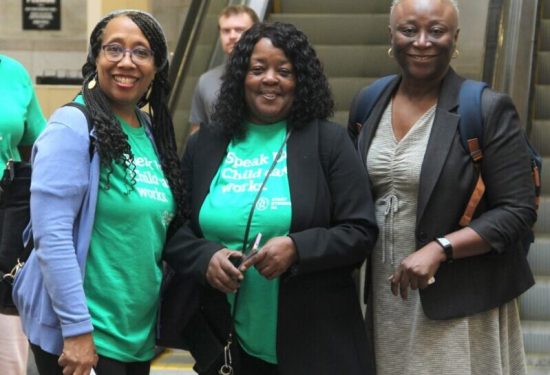By: Natalie Renew, Executive Director Home Grown
As an optimist and a person who believes that progress is always possible, I found 2023 to be a tough year. We saw essential supports to families and child care providers expire, millions of children lose health insurance, reductions in food benefits and the end of many essential pandemic-era benefits. As these supports ended, high grocery and housing costs persisted and we saw political gridlock and inaction at the federal level.
Yet despite these setbacks for low-income families and struggling child care providers, there were some glimmers of hope that I am carrying into 2024, namely:
- The influence of home-based child care is growing and providers and caregivers are continuing to step up to inform, direct and lead in the early-learning system. We are excited to see providers speaking up and sharing their visions for a better system. More partners are working closely with provider leaders to ensure their voices are included in decisions, and the media is elevating provider leaders in storytelling. We are particularly excited to see the growing recognition of family, friend and neighbor (FFN) caregivers as a critical and valuable aspect of the child care system. We know that this sustained and provider and family-led work is essential to building a better child care system.
- The guaranteed income movement is growing in size and shows evidence of wide ranging positive effective effects from reducing child abuse to improving health outcomes. There is increasing recognition that direct cash programs can address immediate and acute needs while supporting sustained community well-being. We are proud to be partnering with communities across the country to leverage guaranteed income to the home-based child care sector. We are also seeing exciting results from the Thriving Provider Project including a decrease in participants who report material hardship and an increase in the likelihood of remaining in the child care field.
- State leaders are prioritizing child care and family support and enacting exemplary legislation to expand child care services, deliver critical benefits to child care providers, and create dependent care tax credits and state versions of the poverty-alleviating child tax credit. Several states have taken action over the past year that demonstrates their understanding that benefits and compensation are essential to building the economic well-being of providers and actions to subsidize health care and child care benefits for providers makes a big difference. A number of states were inspired by the federal expanded child tax credit that made a remarkable dent in child poverty, was easily administered and was very popular. These states have designed their own versions of this program, delivering ongoing and usually unrestricted funds to households with young children. These funds help families afford groceries and housing as well as escalating child care expenses.
As I look to 2024, I want to bring these inspiring trends and hope for their continued expansion and success along with me. With current world events and an upcoming presidential election, it seems unlikely that we will have meaningful action on child care and family support at the federal level in 2024. Despite this, I believe that there is significant and important work we can be doing together to improve the lives and livelihoods of home-based child care providers and the children and families that they serve.
In the year ahead, this is what you can expect from us at Home Grown as we work in partnership with parents, caregivers, providers, provider-led organizations, networks, governments, advocates, researchers and community members across the country.
We will work to:
- Elevate and amplify providers’ voices, stories, guidance and governance of our child care system. In 2024, our Voices from Home partners will continue to engage in local messaging campaigns focused on the value of FFN care. Home Grown will work with Leading From Home, Policy Work Group, Insight Panel and Providers in Residence leaders to “get to the table” to influence system and policy change. We will seek new Leading From Home providers and caregivers this spring and support them in building strong local networks that can make meaningful change locally and regionally.
- Expand direct cash support and related policy on behalf of home-based child care providers and expand benefits access to home-based child care providers and ensure providers do not lose benefits when accessing cash or increased system payments. In partnership with communities across the country, the Thriving Providers Project will expand to four communities in 2024 and, along with the Stanford Center for Early Childhood and our policy advisors, will share learnings and policy implications. Look for a Year One evaluation report of this project in early 2024 (sign up for the TPP newsletter to get all the updates on this exciting work).
- Invest in and support local innovations and city, county and state leaders who seek to strengthen the home-based child care sector. In partnership with the National Association of Counties and the National League of Cities, we will publish a series of briefs that highlight local solutions and approaches to support home-based child care in hopes these innovations can inspire and guide others to do the same. Home Grown is currently recruiting city, county and state government leaders to participate in our third cohort of Building Comprehensive Networks, our technical assistance and co-funding opportunity that builds networks of support for home-based child care providers. We will continue to invest in making the case for and creating resources that build networks of support for home-based child care providers and the benchmarks and indicators associated with network success with our partners at the Erikson Institute. Along with Illinois Action for Children, we will publish new resources this year that support state child care leaders and sponsors in expanding the federal food program to FFN caregivers. We will support a cohort of city and state leaders who are seeking to include or expand the inclusion of FCC providers in public pre-K systems.
- Build on legislative and administrative momentum at the federal level to increase support to home-based child care providers. We are excited to partner with coalitions at the federal level to advance meaningful legislation that improves the Child and Adult Care Food Program (CACFP), to expand awareness and inclusion of FFN caregivers in federal policy conversations, ensure that the successful implementation of the CHIPS Act requirements around child care include home-based child care, and support administrative improvements to the child care and Head Start rules.
- And lastly, Home Grown will continue to grow responsibly with providers leading the way. This year, we will celebrate our fifth year of operations and we continue to pilot efforts to shift decision making to providers, to create provider and community owned assets, and to expand the role of provider-led organizations in our staffing and program implementation approaches. Look for more around who we are, how we do our work and where we are heading along with provider leaders and partners.
We are deeply grateful for your trust and partnership and we hope to strengthen and expand these connections in 2024. We expect 2024 to be a busy and productive year despite the many potential challenges that may lie ahead. We know we will find strength, energy and hope in the community of home-based child care providers, families, advocates and champions that we are so lucky to be a part of.




